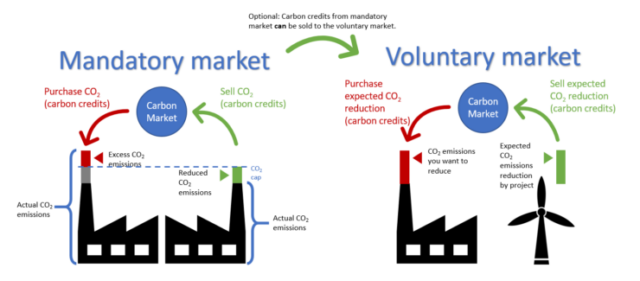
Introduction
Reducing greenhouse gas emissions has become a global priority in recent years, and the voluntary carbon marketplace plays an important role in achieving this goal. In this article, we will explain what the voluntary carbon marketplace is and the benefits it offers to enterprises participating in voluntary carbon marketplace.
What is Voluntary Carbon Marketplace(VCM)?
The voluntary carbon marketplace is where usually companies and organizations can purchase carbon credits that are not regulated by government-mandated emissions reduction schemes. These carbon credits are generated by projects that reduce or remove greenhouse gas emissions, such as renewable energy and reforestation projects. These credits can be purchased by enterprises to offset their own emissions and promote sustainable practices. Carbon credits are verified through some reputable carbon projects registries with certification processes, such as Verra(Verified Carbon Standard) and the Gold Standard, ensuring the carbon credits are of high quality.
Voluntary Carbon Market vs Compliance Carbon Market
The mandatory(compliance) markets allow governments, enterprises, and other organizations to purchase carbon credits in order to comply with caps on the amount of greenhouse gases they are allowed to emit. The markets are created by national and international treaties such as the Kyoto Protocol and the EU Emissions Trading Scheme. On the other hand, voluntary carbon credits are significantly more fluid, unrestrained by boundaries set by nation states or political unions. They also have the potential to be accessed by every sector of the economy instead of a limited number of industries. As Hong Kong has no compliance market now, voluntary market is the best way for enterprises to start exploring international carbon credit projects.
Benefits for enterprises to join
- Purchasing high-quality carbon credits to offset their emissions from their operations, products, and services. Promote sustainable practices among enterprise.
- Demonstrating sustainability leadership and enhancing brand value: Enterprises that participate in the voluntary carbon market can demonstrate their commitment to sustainability and responsible environmental stewardship. This can help enterprises differentiate themselves from competitors and attract more environmentally conscious customers and investors.
- Access to new revenue streams through the sale of carbon credits generated through emissions reduction project and reducing an operation’s carbon footprint. This can provide a new source of income and contribute to the financial viability of sustainability initiatives.
- Increased competitiveness and cost savings through emissions reduction measures and carbon offsetting.
- Accessing expertise and resources: Enterprises that participate in the voluntary carbon market can access expertise and resources from the various stakeholders involved, including standards and certification bodies, project developers, and intermediaries such as brokers and registries. This can help them navigate the complexities of the market and maximize the benefits of their participation.
References:
Article from S&P Global Commodity insights:
Article from McKinsey:
